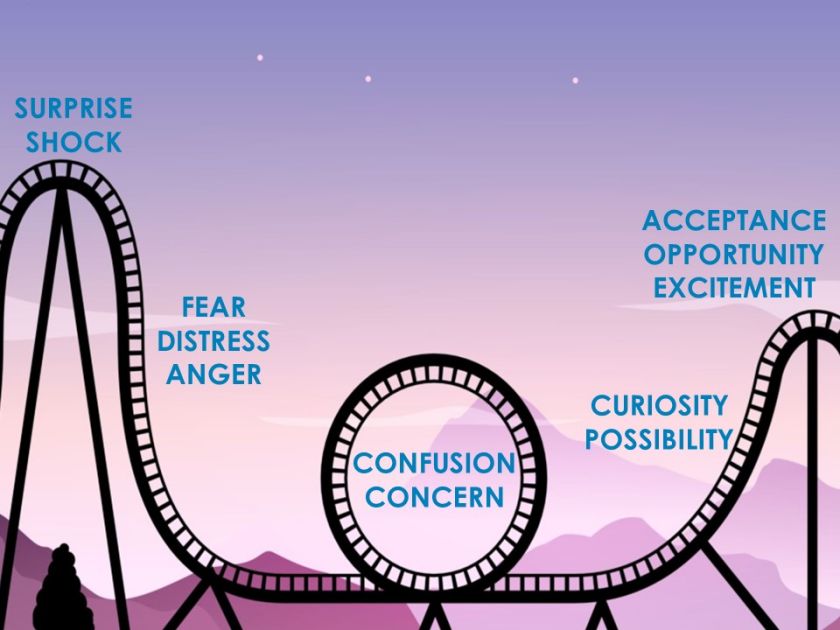Change can elicit different reactions in different people. How do you respond to change? Do you embrace it enthusiastically, shy away from it, or reject it outright? Change can be difficult, particularly when it happens in your workplace, but having the right tools and strategies can help you manage it, and ultimately, thrive on it.
Self-Leadership Through Change
Positive self-leadership requires acceptance and understanding of your emotional needs during such times. Positive self-leadership should assist you to:
- Understand and accept your and other’s emotional responses to change.
- Help yourself to develop strategies to manage stress proactively.
- Help yourself to improve positive mental wellbeing.
- Develop individual strategies to build and enhance effective relationships and supports within your organisation.
1. Model Of Responses To Change

It is important to understand that through times of change, our experiences will be different; we will progress through the change reaction curve at different paces, some individuals will not experience each emotion, some will sit with one response for longer than others.
When we have different responses to our peers, it can increase our sense of disconnection therefore make it harder for people to work collaboratively and to progress the change initiatives. It is important to recognise each emotion and have a strategy to manage emotional responses as they occur.
Knowing where you are on the curve can assist you to equip yourself with the appropriate supports to help you transition as required.
Take time to reflect on where you are at in the reaction cycle, and how you can get your needs met. It can also be useful to discuss these possible reactions with your colleagues and the differences in where each of you are on the reaction cycle in order to support others.
2. Strategies To Manage Stress
In her famous TED talk on stress, psychologist Kelly McGonigal explains that rather than trying to calm down your pounding heart when stressed, you instead view the stress reaction as your body getting ready for the challenge, giving you the energy to deal with the issues.
Your pounding heart is preparing you for action and faster breathing is getting more oxygen to your brain so that you can think more clearly. She argues that how you think about stress matters. A Harvard University study was conducted that asked one group of participants to rethink their bodies’ response to stress. The group that positively reframed their stress responses experienced a less negative effect from stressful situations.
We recognise that many people react to change with stress responses; uncertainty and change can elicit these responses. You can use the change as an opportunity to demonstrate and encourage yourself to positively engage with proactive stress management strategies. This way you are able to take positive actions rather than feel overwhelmed by the stress.
Deci and Ryan, two educational behaviourists, identified a model with three components that they believe affect our motivation and performance in different settings. These components are competency, control and belonging.
Competency
We need to feel that we are competent and that we have the skills and tools required to do the job – from brushing our teeth to pulling together an end of year financial report. We don’t like to feel as if we are in over our heads, or that we don’t have the required skills and competency to do what is required of us. This links back to our definition of stress.
Control
We need to feel that we have a choice and some autonomy over the way in which we go about our lives. A core factor is that we often don’t like change. As Mark Twain said, “the only person who likes change is a baby with a wet diaper”. Even then, it’s not really the process of change that the baby likes, it’s the result, right?
Belonging
We need to feel that we belong to something or to someone and that we are accepted, valued, respected and cherished – by someone or some group. We are social creatures and it is not just about being part of a group but importantly, we want to feel that we are a valued member of the group and that we contribute in meaningful ways.
Ways You May Use These Three Components:
- Think about a situation that causes you stress.
- Next consider what is the core issue that is triggering the stress?
a) Is it a lack of competency? Are you lacking the necessary skills and abilities?
b) Is it that you don’t feel that you have enough control?
c) Perhaps you feel that others are trying to control you?
d) Maybe you feel you have too much control and you are daunted by it?
e) Perhaps there is an issue around belonging? Do you feel disconnected, alone, isolated, misunderstood or unappreciated? - Finally, determine possible strategies to alleviate the stress in that area. For example, if you are feeling stressed about the amount of work you currently have, stop and think. Are the tasks difficult because you feel that you don’t have the skills needed to complete them? Is it that the workload feels out of your control? Do you feel undervalued in your job? Maybe you have the skills to do the job, but you feel that you cannot control how much work comes in, because you are short-staffed. What can you do to get some control back? Perhaps you can delegate some tasks to a colleague, or ask your manager for a prioritised list of tasks.
There are many different stress management models. This one is a simple tool that you can use to help deal with issues that may arise around periods of change. If you are experiencing a high stress response that is distressing to you or that is impacting on your functioning or wellbeing then it is advisable to seek specific individual support from your EAP provider.

3. Positive Mental Wellbeing
Shawn Achor conducted a program with KPMG employees in the lead up to tax time. The employees were instructed to choose one of five activities that correlate with positive change to personal wellbeing:
- Jot down three things for which they were grateful.
- Write a positive message to someone in their social support network.
- Meditate at their desk for two minutes.
- Exercise for 10 minutes.
- Take two minutes to describe in a journal the most meaningful experience of the past 24 hours.
The participants performed their activity every day for three weeks. Several days after the training concluded, they evaluated both the participants and a control group to determine their general sense of wellbeing. How engaged were they? Were they depressed?
On every metric quantifying optimism and life satisfaction, the experimental group’s scores were significantly higher than the control groups. When both groups were tested again, four months later, the experimental group still showed significantly higher scores in optimism and life satisfaction.
Just one quick exercise a day kept these tax managers happier for months after the training program had ended. Happiness had become habitual. Learning resilience and positive wellbeing skills can be a positive step in helping you to manage your mental wellbeing proactively.
4. Effective Relationships And Supports
In further research, Achor, Ben-Shahar and Stone determined that social support indicated as highest predictor of happiness during high periods of stress. They suggest from their research that support received is important but support given is an even more important factor in sustained engagement and happiness.
- How can you increase supports and model this for others?
- How can you increase supports for each other and increase sense of belonging and connectedness within your team and to the broader organisation?
References
- L. Leahy & N. Chamberlain, “Surviving Change”, Strategic HR Review, Vol 7, No. 6, 2008
- Deci, E. L., “Effects of Externally Mediated Rewards on Intrinsic Motivation”, Journal of Personality and Social Psychology, 18; 1971
- “Positive Intelligence”, S. Achor, https://hbr.org/2012/01/positive-intelligence
- K. McGonigal, TED talk, https://www.ted.com/talks/kelly_mcgonigal_how_to_make_stress_your_friend
-
 Leading Positively through Change | eLearning Course$198.00 inc.GST
Leading Positively through Change | eLearning Course$198.00 inc.GST -
 Building Buoyancy | eLearning Course*$180.00 inc.GST
Building Buoyancy | eLearning Course*$180.00 inc.GST -
 BLOOM! AT WORK! A Mental Health Guide for Leaders$25.00 inc.GST
BLOOM! AT WORK! A Mental Health Guide for Leaders$25.00 inc.GST
Tap into our mental health expertise
Images: Chris Lawton (Unsplash) and Christina Morillo (Unsplash)



